The Instagram wellness influencers spreading climate misinformation
A new report details a growing fad among a certain sect of conspiracy-minded health and lifestyle influencers on Instagram: climate denial
When Cecile Simmons, a part-time yoga instructor, scrolled through her Instagram feed earlier this year, she noticed something peculiar happening among the health and wellness influencers she followed: some had started posting climate change conspiracies.
A post from the New Age spirituality account @aguidetoawakening, for example, had told its 10,900 followers that the “The accelerating ‘climate change’ is not due to human activities,” but due to the “organic phenomenon of Asciention Mechanics.”
Another post from @drmercola, a homeopath with 500,000 followers, claimed that “Biden wants to block out the sun to save the planet.” That post garnered 8,470 likes and 1,405 comments.
Alarmed, Simmons—who also happens to be a full-time misinformation researcher—decided to look into the phenomenon further. And on Thursday, the results of her research, published by the Institute for Strategic Dialogue, found that a small group of self-styled health and lifestyle gurus are helping climate denial find traction with new audiences.
Simmons compiled 154 Instagram wellness influencer accounts that regularly post about conspiracy theories and New-Age spirituality—an area academics refer to as “conspirituality”—and found that these accounts, with more than 9.5 million followers total, had created 140 posts mentioning climate change or the environment over the course of a year.
The top themes of these posts, according to the report, included “outright rejection” of climate science; skepticism about the impact of climate change on natural disasters, false claims about the climate impact of animal agriculture, and claims that climate change is a result of “geoengineering” and government control.
One post this summer by fitness influencer @iansmithfitness, who has more than 414,000 followers, said, “The wildfires will continue until you submit to climate change regulations.”
Another post from @carnivoreaurelius, an alternative health account with more than 700,000 followers, said going vegan is “one of the greatest scams we were ever told,” in part because “animal based agriculture” produces less greenhouse gases than “plant-based”. None of that is true, but the post has more than 60,500 likes, and 1,955 comments.
“These are people who you would expect to be invested in climate and the environment,” said Simmons. “What they're actually doing is promoting this kind of hyper-individualistic pursuit of health. That's how you get to these rightwing anti-climate narratives.”
It’s not surprising climate misinformation is rife on Instagram; the platform, now owned by Facebook parent company Meta, has been rife with conspiracy theories for years. But the wellness community is new territory for climate denial, which is more likely to be spread via conservative news or right-wing accounts—not via aesthetically pleasing posts from natural parenting advocates and nutritionists.
“Wellness influences have been key in promoting self-optimization and self-actualization,” said Simmons. “So there is a risk that when faced with the fear of climate change, people will focus on self-optimization as opposed to embracing collective action.”
These Instagram micro-celebrities have more than a long reach: they also have a unique relationship with their followers. Yoga instructors, athletic trainers, nutritionists, and even astologists are reframing climate denial as a way to self-guard your health, and climate misinformation as empowerment.
"There's something quite powerful about the trust that these people kind of have among their audiences,” said Simmons.
This isn’t the first time the wellness community has made extremist views mainstream. During the early years of the pandemic, misinformation researchers started noticing that among the yoga poses and fitspiration posts, wellness gurus were prolifically posting about QAnon, the conspiracy theory that former President Trump saved the world from pedophiles (among other things).
The QAnon posts were aesthetically pleasing and Instagram-ready, leading one researcher to dub it “Pastel QAnon.” The rebranding helped spread QAnon to younger, and more female, audiences.
The same spaces were also susceptible to anti-vaccine misinformation, which was spread rapidly during the pandemic by yogis and other alternative health accounts, according to misinformation researchers like Stephanie Alice Baker, a sociology professor at City, University of London.
Baker says the pandemic turbocharged conspiracy theories in the wellness space. Wellness influencers may “combine nutritional advice and exercise tips with self-development and new age spirituality,” said Baker, but they have become an effective way to promote extreme far-right, even fascist, ideals.
“There is this overarching concern in the wellness space, and the New Age space in particular, with purity and this idea about right moral action,” she said. That made wellness advocates more susceptible to extreme rightwing ideals “because purity is one of the values that is so sacrosanct to a conservative moral outlook.”
But they’d never shared climate conspiracies until relatively recently, according to the report.
Many of the climate misinformation posts in the study date to last summer, when record heatwaves and wildfires made the climate crisis the top story for months on end. The timing is not a coincidence—after capitalizing on people’s fear of lockdown, pandemic safety restrictions, and vaccines, influencers looked for their next boogeyman.
“People saw that freedom of movement, that freedom of choice can genuinely shift overnight,” said Jennie King, the head of climate research and policy at ISD. “So for those who had already been trying to spread the belief that the climate agenda was a precursor to tyranny, it was a very convenient community that they could infiltrate.”
So far, Meta has left most of these posts untouched, despite a climate misinformation policy that says the company works with “90 independent fact-checking organizations” to review climate-related content. When fact-checkers rate content as false, they add a warning label and reduces its visibility on the platform, according to the company’s policy.
Meta also says it “takes action” against accounts that post repeatedly share false claims. But an analysis last year by the Center for Countering Digital Hate found that Meta failed to flag about half of Facebook posts containing climate misinformation—and something similar appears to be happening on Instagram. Without transparency from Meta, it’s impossible to know the true extent of the wellness community’s climate misinformation problem, the researchers found.
“We take climate change seriously, which is why we take steps to make sure people have access to reliable information while reducing misinformation,” a Meta spokesperson wrote in an email, which repeated talking points from climate misinformation policy. The spokesperson declined to answer specific questions on the record.
Still, King believes the solution is not to remove wellness conspiracy theorists from social media—because even though the conspiracies aren’t real, their audience’s fear of the future is.
“It's not helpful to other these groups by saying they're ridiculous and they shouldn't be taken seriously,” said King. “Because they do have tens of millions, if not hundreds of millions, of people that to some extent engage with those belief systems.”
Instead, King said, “We have to ask ourselves collectively: what is it providing that isn’t being delivered by the mainstream?”
In the end, it may be the sense of comfort and understanding people get from their spiritualists and wellness gurus–a warmth they may not necessarily feel with the scientific community.
“I think that you need to view people at that stage as being at a crossroads,” King said. “Just because something has become a more prevalent concern, doesn't necessarily mean it's a foregone conclusion that they'll be pushed towards credible science.”
Catch of the day: Eleanor the Labrador and her sister from another mister, Chloe, left their home in South California to start a new adventure with in La Costa Del Sol, Spain. Even with sea levels rising, the pups and their dog dads Tony and Matt are happy to enjoy their new life along the shores of the Mediterranean.
Cheers to living life in dog years as a way to cope with climate change!
Want to see your furry (or non-furry!) friend in HEATED? It might take a little while, but we WILL get to yours eventually! Just send a picture and some words to catchoftheday@heated.world.



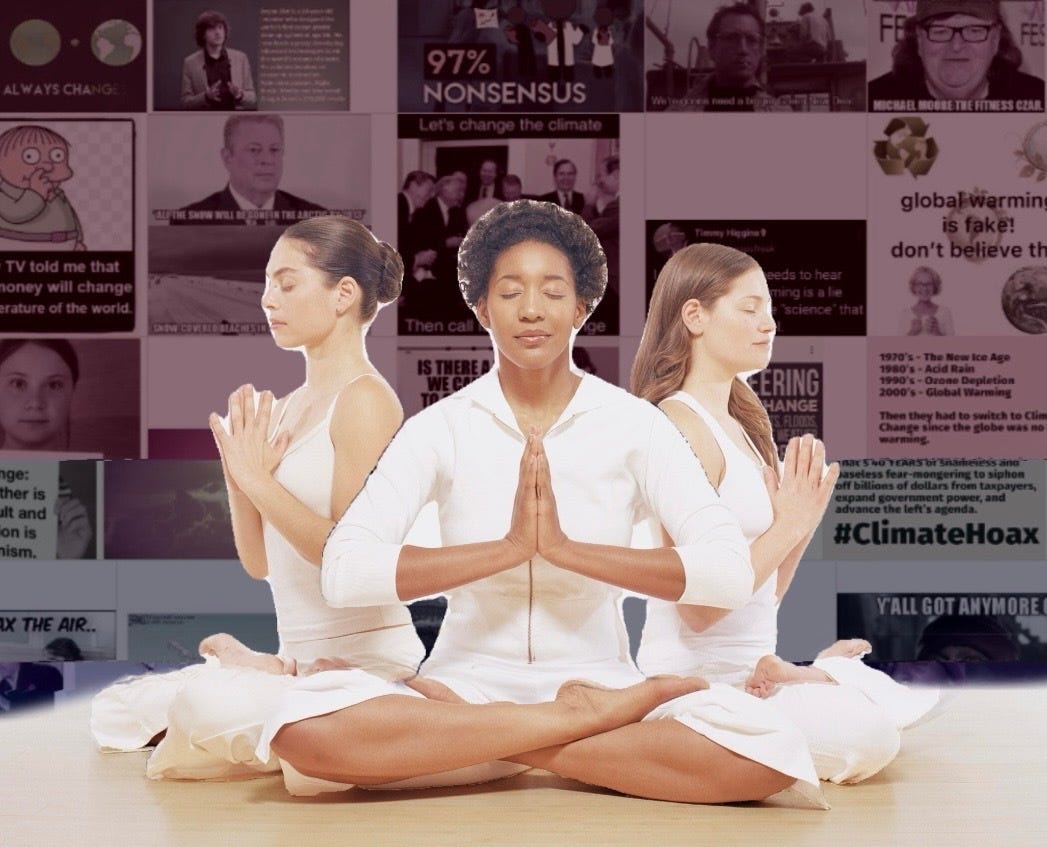

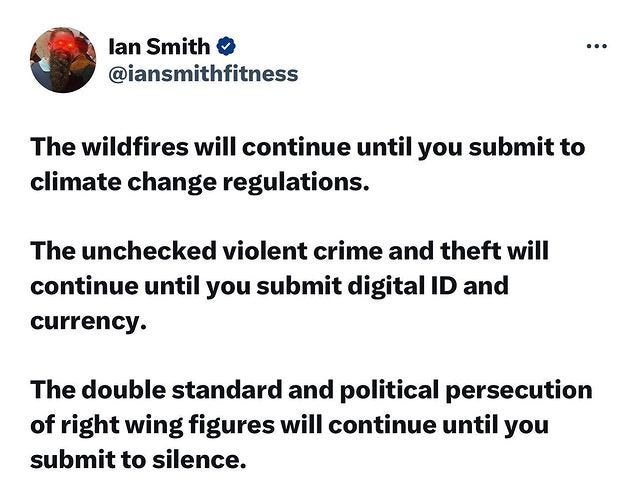
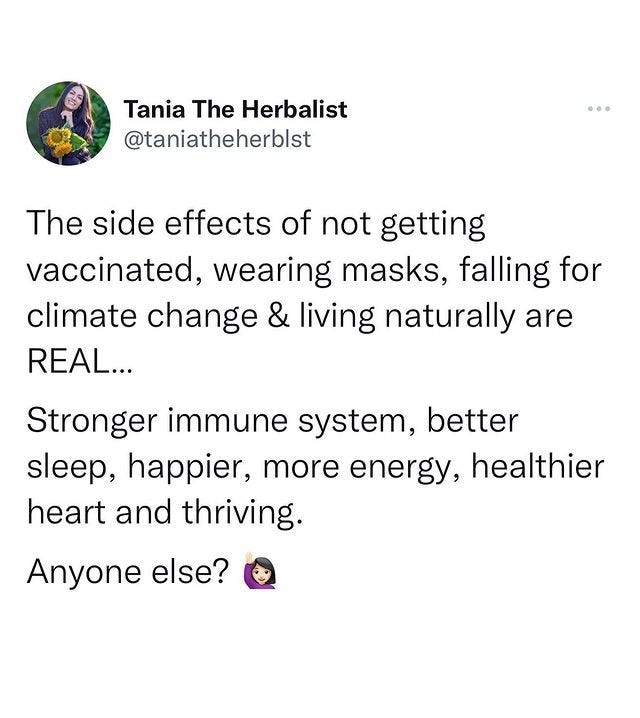
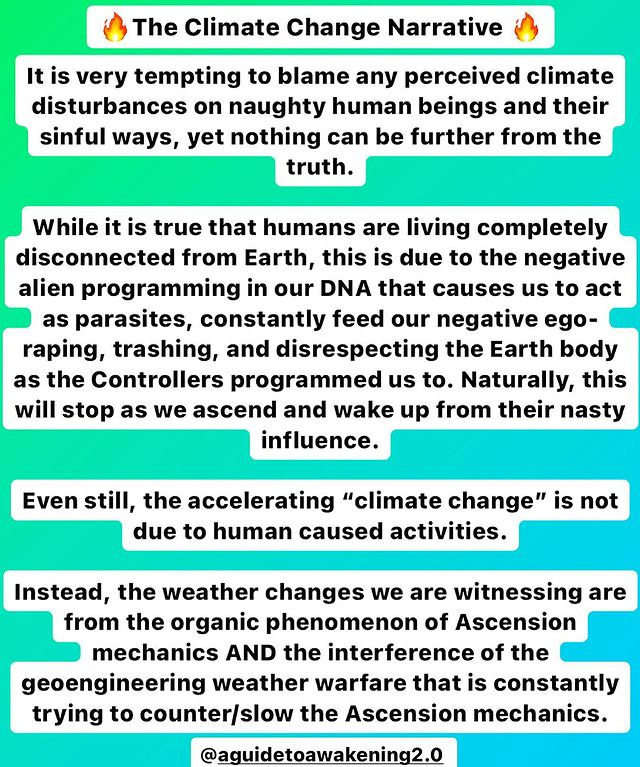

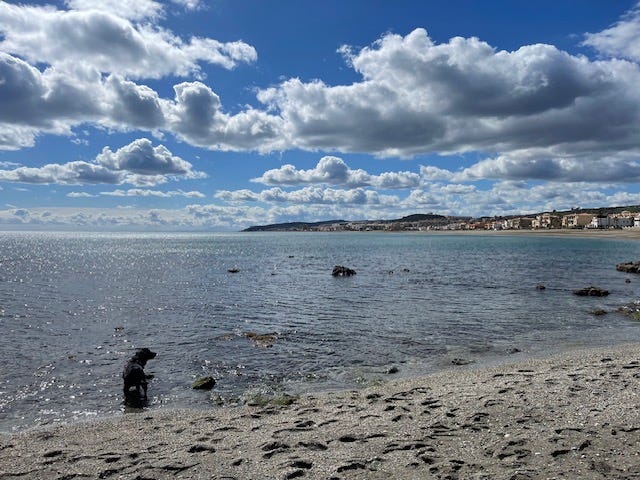

The whole idea that our society has produced "influencers", people who contribute nothing of substance to anyone's life beyond telling them what to do, just blows my mind. People don't want to think, yet at the same time they want someone to confirm the views that they already have. Influencers fill that void, I guess. It's one more checkmark in the negative column for social media.
I'm curious if it would be helpful to counter the narrative on these influencer posts, with comments such as "Denying science is not mental wellness. Solutions reporting helps combat climate anxiety," or if it just feeds the social media monster 😅 It's hard to have the self-restraint to not engage with blatant misinformation.